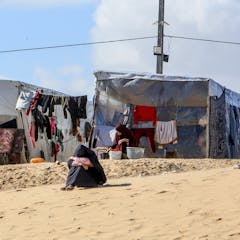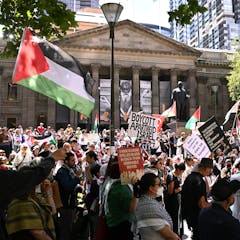
Articles sur Palestinians
Affichage de 1 à 20 de 178 articles

AI is enabling a huge number of decisions about who to target. They are not always the right ones.

In 2015, I saw Jewish and Muslim students forge a set of group agreements so they could dialogue on the Middle East conflict. Initiatives like this or a ‘Semester in Dialogue’ program are promising.

Experts say mainstream media coverage of the war in Gaza is severely skewed — with Palestinian voices getting stifled.

A long-running conflict between adversaries Israel and Iran fell short of open confrontation – until both countries took more direct aim at each other.

Refugee programs in Canada have always been politicized, but more so in recent years, evidenced in discrepancies between programs for refugees from Gaza and Sudan and those from Ukraine.

Labor MP Josh Burns joins us to discuss the government moving towards recognition of a Palestinian state to help facilitate a two-state solution and the wider Middle East crisis.

The Palestinian enclave faces an interconnected series of crises that will amplify the human costs of conflict even when the bombing ends.

The government’s rhetoric in response to the death of the Australian aid worker is stronger than we’d previously seen, but in a conflict with no clear solutions, little will change.

This isn’t the first time the US military has turned to building a pier to help reach people during times of war or other crises.

When the real-life impact of anti-Zionism results in cries advocating for the killing of Jews, then anti-Zionism can only be understood as antisemitism.

A Christian Palestinian human rights scholar who grew up in Bethlehem writes about the special time of Easter, but also about the restrictions on Palestinian Christians.

The deep connection of homes in Gaza to Palestinian land, territory and nationhood makes Israel’s destruction of them a genocidal tactic.

We speak with Hilal Elver, the former UN Special Rapporteur on the Right to Food and current University of California professor about the looming famine in Gaza after months of Israeli attacks.

Canada’s tepid response to the war in Gaza and the severe harm caused to Palestinian women casts doubt on the sincerity of the government’s Feminist International Assistance Policy.

Israel has made it clear that Hamas should have no role in Gaza after the war. But seeking an alternative in the Palestinian Authority is fraught with problems.

Bearing witness to the displaced victims of the Oct. 7 attack on Kibbutz Be'eri carries a burden of responsibility to observe and document

The contours of the Middle East conflict have long influenced Israel’s migrant worker policy.

How the media talks about suffering on one side compared with the other can often reveal bias in the Israeli-Palestinian conflict coverage, writes a scholar of media bias and the Arab world.

Writers festivals navigate the fraught frontier between social media’s echo chambers of outrage and the civilised public debate of the public square. What’s the way forward in this heated atmosphere?

A selection of our coverage of the conflict in Gaza from the past fortnight.
